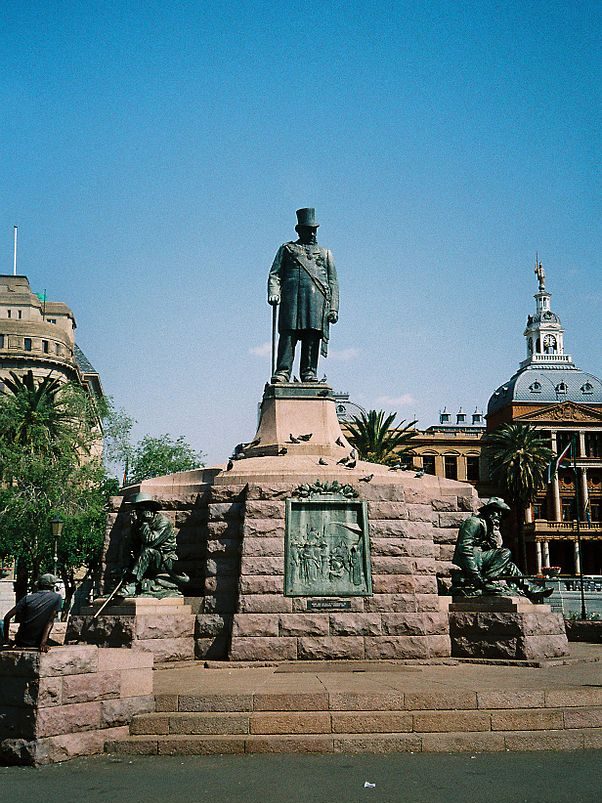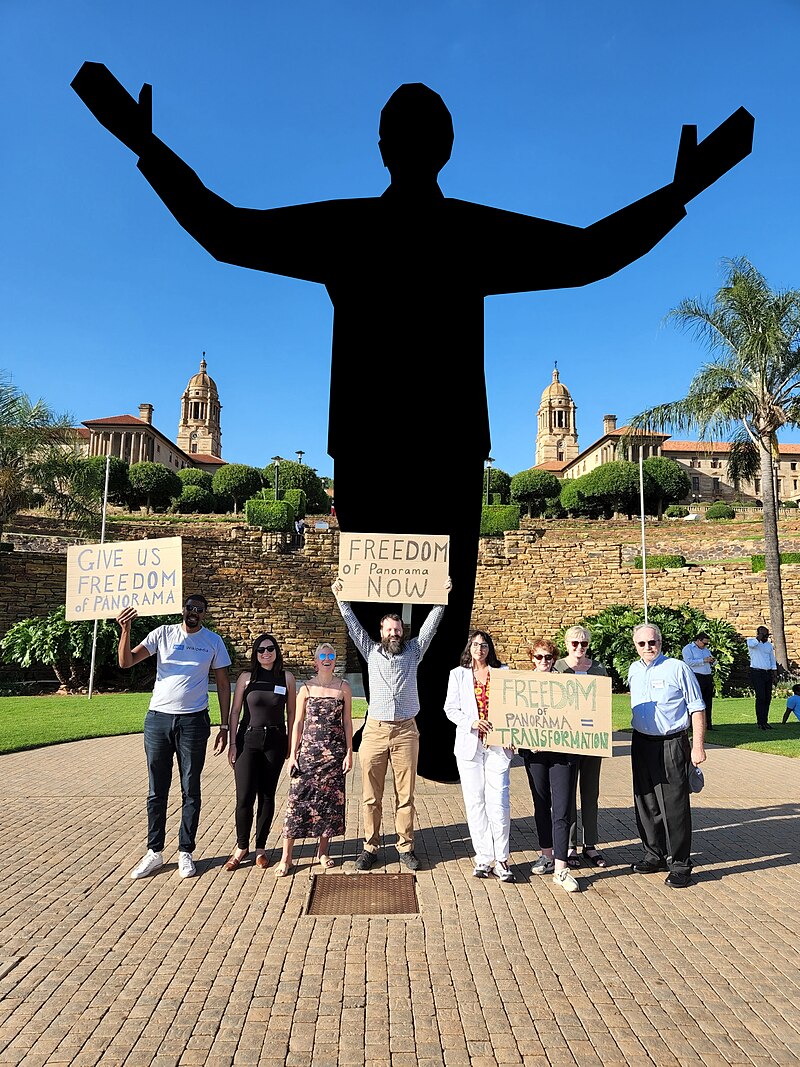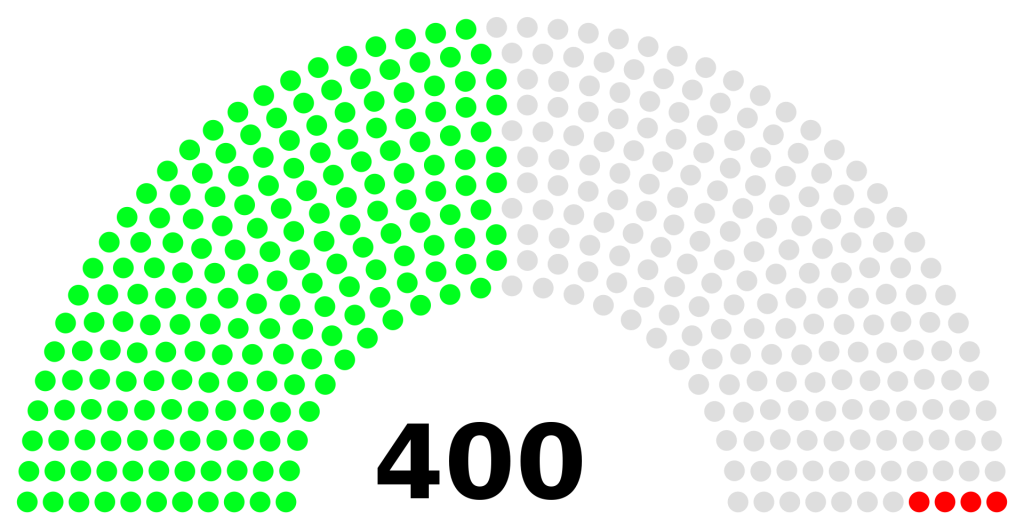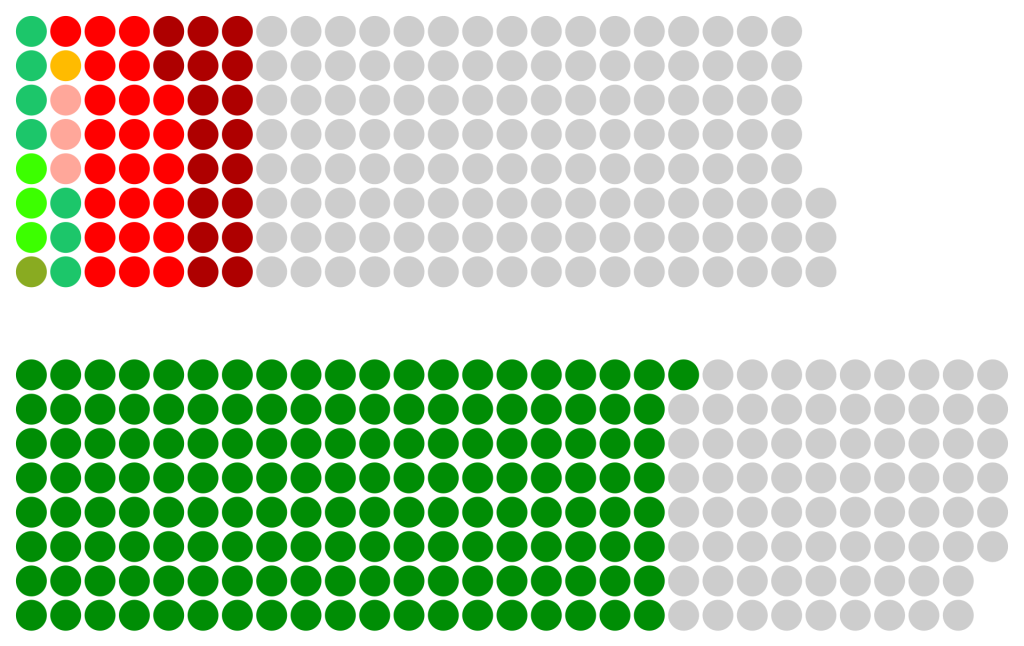A summary of Wikimedia chapter’s efforts to encourage more inclusive copyright exceptions.
In September 2012, Wikimedia South Africa launched its first event since being legally established only 7 months before. Wiki Loves Monuments 2012 in South Africa was intended to be a celebration of all of the country’s heritage through photographs of public monuments; both new and old. Instead we found that was impossible. This began the chapter’s long advocacy adventure to change the country’s copyright law. An adventure which is not yet finished.
Background
Soon after launching Wiki Loves Monuments, we discovered that we were not allowed to accept photographs or multimedia of recently built monuments. This is because South African law has no copyright exception for creative works located in public spaces such as national monuments or the facades of buildings. Although the photographer owns any copyright to the picture they take, the original creator of the work – e.g. building – still retains a copyright in any reproductions, which in this case is a photograph. This meant that for Wiki Loves Monuments, permission would have to be given by both the photographer and the original artist/architect/owner of the publicly located work.
This was not a problem for older colonial era monuments as any copyright that might exist for them had long expired and so was in the public domain. Such pictures could therefore be freely photographed, shared online, and uploaded to Wikimedia Commons. This created a perverse situation where we could not celebrate recently built monuments erected to remember South Africa’s more recent history, such as the struggle against apartheid. This limitation also applies to the thousands of people who might take photographs of these recent works and unknowingly share them on social media. Freedom of Panorama fixes this by granting a copyright exemption for works located in public spaces such as public statues, monuments, and the facades of buildings.


Following this experience Wikimedia South Africa decided to advocate for the adoption of a Freedom of Panorama exception in South African copyright law in 2014. A volunteer was selected to drive the advocacy effort (the author) which helped ensure accountability and allowed for specialization of expertise on the issue. But first we needed to learn out how to advocate.
Starting off: advocating for change
The chapter was fortunate as our friends at Creative Commons South Africa introduced us to stakeholders involved in copyright reform advocacy. We then spent the next three years attending workshops, public participation processes, and conferences focused on amending South Africa’s copyright legislation. Through these efforts, the chapter learnt a great deal about the government’s public consultation process, built relationships, shaped our message, and met like-minded groups who were also working to expand copyright exceptions for the public good. We also submitted a number of proposals to parliament making the case for Freedom of Panorama to be included in the Bill updating copyright law.
In 2017, the government announced that the parliamentary committee setup to draft the Copyright Amendment Bill would start public hearings. This was our chance to get Freedom of Panorama adopted; but first we needed to obtain a broader and stronger mandate from the South African Wiki community generally to pursue this with full confidence. A strong consensus was obtained from the local Wiki community and a public petition, using banner ads on Wikipedia in South Africa, was launched calling for Freedom of Panorama. The chapter was invited to give testimony to parliament on the necessity for Freedom of Panorama to be included in the Copyright Amendment Bill.
Throughout 2018 the Bill was discussed during open sessions of the parliamentary committee. Crucially a representative of Wikimedia South Africa (the author) sat in on most sessions. This turned out to be important as we noticed that the committee forgot to discuss Freedom of Panorama. Due to our presence in the poorly attended public sessions, we were able to remind the committee members to not omit it. This ensured that a Freedom of Panorama clause was eventually included in the final draft of the Bill. We then had a Bill with a Freedom of Panorama exceptions clause.
During this period, Wikimedia South Africa along with groups representing librarians, documentary film makers, educationists, and the blind community co-founded ReCreate; an umbrella organisation that provided a platform for allies to communicate, coordinate and share resources when advocating for expanded copyright exceptions, like Freedom of Panorama and Fair Use, for the public good. ReCreate would turn out to be an important ally in advocating for the Bill.

On 5 December 2018, the lower house of parliament passed the Copyright Amendment Bill. Unable to outvote the parties in support of the Bill, opposition political parties tried to block it by ensuring that less than 50% of the house was present to vote. Therefore the opposition only sent a token presence to express their discontent with the Bill during voting, and hoped that not enough pro-Bill MPs would attend the vote. This did not work as 201 out of 400 sitting members of parliament were present on the day. The vote then went onto the upper house of parliament, the Council of Provinces, for a second round of voting which took place three months later.
It was a close call but the Bill was passed by both houses of parliament and sent to the President of South Africa for signing. At the time, we did not know how far away we still were and hoped that the Bill would be gazetted into law within six months.
The long haul: keeping the Bill alive
The President landed up sitting on the Bill for two years before sending it back to parliament to reconsider six issues of concern. The South African Constitution states that it should have taken no longer than six months to make a decision on the Bill. This delay resulted in one of our allies, Blind South Africa, taking the presidency to the Constitutional Court. In addition to Freedom of Panorama, the Bill also included a section ratifying the Marrakesh Treaty that granted copyright exceptions for transcribing written content into an accessible format for the blind community; which they urgently needed. Three years later, the High Court judged that not ratifying the treaty in a timely manner was a denial of the blind community’s right to access knowledge.
Throughout this time, opponents of the Bill waged a campaign in the media spreading misinformation and disinformation about it. A particular target of the campaign was to create confusion and outrage at the adoption of Fair Use which would replace the Fair Dealing copyright exemptions system in the old act. Critics of the Bill misleadingly stated that people would be able to legally pirate entire books or whole songs under Fair Use, thereby robbing authors and musicians of their royalty rights. This is totally false and played off the public’s lack of understanding of copyright and the complex legal jargon around it.
To combat misinformation and disinformation, supporters of the Bill had to spend a lot of energy correcting these accusations in the media so as to mitigate the damage this caused. Having a large network of allies to spread this effort over was very helpful, but with hindsight the impact would have been greater if the Bill’s allies had the same access to resources as the opponents.
Some of the strongest opponents of the Bill were the royalty collecting societies who argued strongly against Fair Use. It is worth noting that the Performers Protection Bill, which is intimately and inseparably linked to the Copyright Amendment Bill, increases the penalty for collecting societies for not paying royalties to authors. The old copyright act simply imposes a fine that was set in 1978 and never adjusted for inflation whilst the new Bill would increase the penalty to up to a year of revenue and/or up to five years in prison. Preventing passage of the Copyright Amendment Bill would prevent the implementation of this change in penalties, which serves the interests of some of the more dishonest collecting societies.

By the beginning of 2022, the South African Parliament had almost completed its review of the Presidency’s concerns with the Bill and held a number of public hearings. An amended version of the Bill was voted on in parliament and passed for a second time with 163 votes in support, 45 against and no abstentions. The following year the amended Bill was sent on a public participation tour of all of South Africa’s provinces after which the Council of Provinces again voted on it; passing it in June 2023 with only 2 out of 9 provinces opposing the Bill.
Currently the concern is that the Bill will not be passed before the next general election later in 2024. The uncertainty over the outcome of the election and its impact on the passage of the Bill into law remains an issue to watch out for. The adventure continues, we are so close to getting Freedom of Panorama in South Africa… and yet still so far.
Lessons learnt
Throughout this process Wikimedia South Africa learnt a number of valuable lessons that others might also benefit from. These are:
- Be patient and persistent. Five years is very quick, ten years is more likely, but it can take as long as twenty or more years in some cases to amend a law. The longer you work at it, the more likely it is that you will be successful.
- Be bold. Don’t be afraid to contact legislators and their staff, ask them for face to face meetings, or invite them to events to better understand the issues. Don’t be afraid to write to or talk to the media about your issues. Communication is key.
- Be consistent. Consistently respond to false information about your cause in the media and be consistent in your message about why your issue is important.
- Cultivate friends and allies. This will allow you to amplify your collective voice and share resources and insights.
- Know your adversaries. Understand who they are and why they oppose your position. It will help you develop strategies to more effectively communicate your message, work around them and overcome any challenges. In some cases you might be able to convince them to support you and turn them into allies.
- Get organised. The better organised your community of supporters and your network of allies are, the more likely it is that you will succeed. An organised, focused and motivated group is an effective and hard to ignore group that can get things done.
It is important for us to recognise that we had four significant strokes of good luck on our side. One, we had a compelling narrative that was difficult to challenge in South African politics and were able to illustrate our complex legal issue with pictures; this helped people understand it quickly and easily. Two, the Bill has the support of the majority of Members of Parliament. Three, Wikimedia South Africa was able to quickly learn the process of advocating Parliament for legal change thanks to the friendly advice of a well informed partner organisation (Creative Commons South Africa). Four, Wikimedia South Africa had volunteers who were prepared to drive the advocacy process for as long as it takes to get the Freedom of Panorama.
We have had bad luck as well such as a Presidency that has been very slow to review the Bill and a well resourced network of energetic adversaries (often unscrupulous) who oppose it.
If you are interested in learning more about Wikimedia South Africa’s advocacy efforts in support of Freedom of Panorama and Fair Use then please check out our advocacy page on Meta-Wiki.
Image credits:
- Krugermonument by Picman, CC-0
- Freedom of Panorama protest in South Africa 2023 01 by Discott, CC-BY-SA 4.0
- 2018 South African Copyright Amendement Bill passage.svg by Discott, CC-BY-SA 4.0
- South_African_Parliament_vote_on_the_CAB_and_PPB_on_1_September_2022_v2.svg by Discott, CC-BY-SA 4.0

Can you help us translate this article?
In order for this article to reach as many people as possible we would like your help. Can you translate this article to get the message out?
Start translation